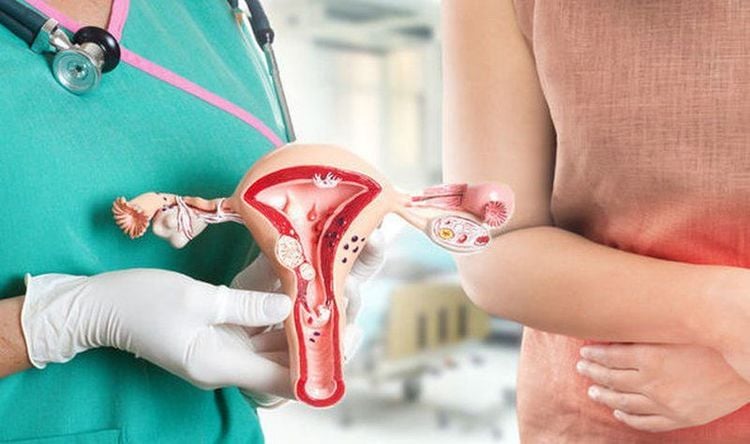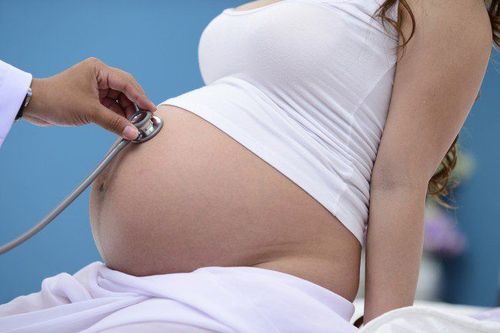This is an automatically translated article.
The article was professionally consulted by Doctor Nguyen Chi Quang, Department of Obstetrics and Gynecology - Vinmec Central Park International General Hospital.Hysterectomy has become one of the most common types of surgery today. Partial or total hysterectomy can be performed, and the extent of the hysterectomy will depend on the reason for the surgery.
1. What is hysterectomy?
A hysterectomy is a surgical procedure to remove the uterus through an incision in the lower abdomen. The uterus is the place where the fetus develops. A hysterectomy involves removing one or both ovaries and fallopian tubes. This is the most common surgical procedure in women.A hysterectomy can be done through a vaginal hysterectomy or laparoscopic surgery. The extent of the hysterectomy will depend on the reason for the surgery.
2. Hysterectomy: when to perform?

Nếu bạn bị ung thư tử cung thì phẫu thuật cắt bỏ tử cung chính là lựa chọn điều trị tốt nhất
Uterine cancer: if you have uterine cancer, a hysterectomy is the treatment of choice. the best. Depending on the progression of the disease, other treatments such as radiation or chemotherapy may be needed. Uterine fibroids are large: hysterectomy is a certain indication, a solution for uterine fibroids (benign uterine tumors that cause prolonged bleeding, anemia, pelvic pain or bladder pressure). optical). Depending on the degree of discomfort and the size of the tumor, the doctor will decide on the appropriate surgical method. Usually, when the fibroids are large, a hysterectomy is indicated. Endometriosis: Endometriosis, the tissue lining the inside of the uterus that grows outside the uterus into the ovaries, fallopian tubes, or other pelvic or abdominal organs. If treatment or surgery does not improve endometriosis, a hysterectomy with removal of the ovaries and fallopian tubes should be performed. Uterine prolapse: This condition occurs when the supporting ligaments and tissues weaken. Uterine prolapse can lead to urinary incontinence, pelvic pressure and difficulty with bowel movements. A hysterectomy is necessary. Uterine infection: An infection of the uterus causes prolonged vaginal bleeding. If your periods are heavy, infrequent, or last for a long time, having a hysterectomy can help with uncontrolled bleeding. Uterine Rupture: A tear in the lining of the uterus through the muscle layer. Uterine rupture can cause damage to either the bladder or the digestive tract. When the wound is serious, jagged, wide and has a long rupture time, a hysterectomy is required. Chronic pelvic pain: hysterectomy may be the last resort needed to address chronic pelvic pain. Before performing this surgery, it is necessary to accurately assess the patient's health condition to determine whether a hysterectomy should be performed or not Do not want to become pregnant : if you do not want to become pregnant anymore, you can perform this procedure. hysterectomy method. However, your doctor will present you with many other options. In the case of cancer patients, surgical removal of the uterus is the only option. While performing a hysterectomy, the surgeon may perform surgery that involves removing the ovaries and fallopian tubes.
3. Possible complications after hysterectomy

Bệnh nhân cảm thấy mặc cảm bản thân, và cho rằng mất tử cung sẽ ảnh hưởng đến vấn đề sinh lý của bản thân
Some of the risks associated with a hysterectomy include:
Blood clots Infections Excessive bleeding Reaction to anesthetics Causes damage to the urinary tract, rectum, bladder or pelvic structures during surgery Early onset of menopause Very rare but possible risk of death during surgery. Women's psychology is greatly affected. Many people worry after hysterectomy, this has caused negative effects on the treatment process, caused a lot of anxiety before surgery and prolonged post-operative depression. They feel guilty about themselves, and think that losing their uterus will affect their physiology. However, hysterectomy does not reduce a woman's sex drive, but the main reason is psychological instability of women. Therefore, before deciding to perform a hysterectomy, husband and wife need to explain and sympathize with each other to help women stabilize their mood.
Currently, at Vinmec Central Park International General Hospital, we have been applying robotic hysterectomy with the implementation and direction of Dr. Nguyen Chi Quang - Obstetrician and Gynecologist, with many years of experience. Deep professional experience and strength in the treatment of obstetric and gynecological diseases such as:
Laparoscopic surgery Uterine fibroids Laparoscopic surgery for ovarian tumors Laparoscopic surgery for genital prolapse This is a safe method, less invasive and high accuracy, besides the relatively low cost of implementation for the patient. Patients can be completely assured when choosing Vinmec Central Park to perform a hysterectomy.
Customers can go directly to Vinmec Central Park to visit or contact hotline 0283 6221 166 for support.














